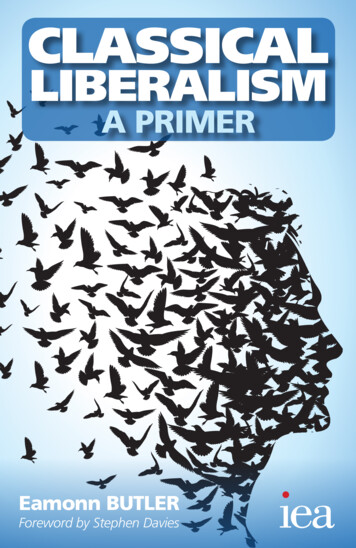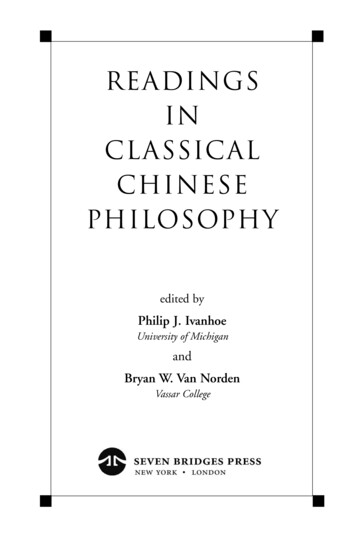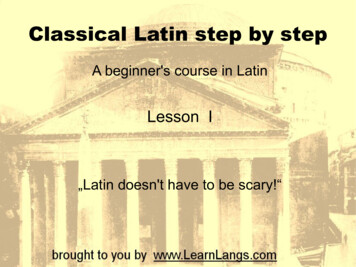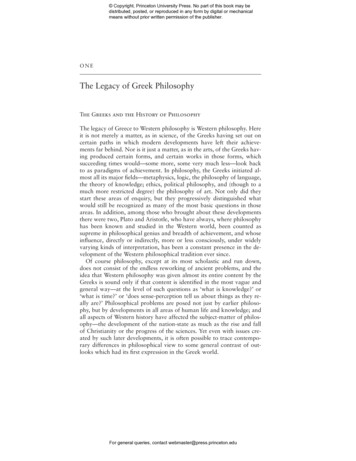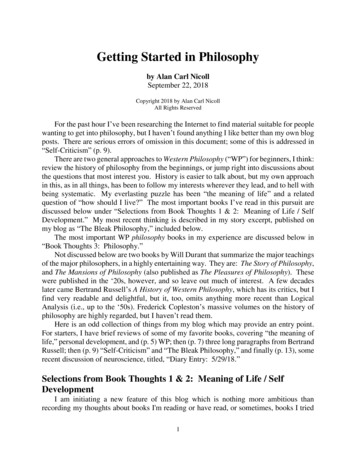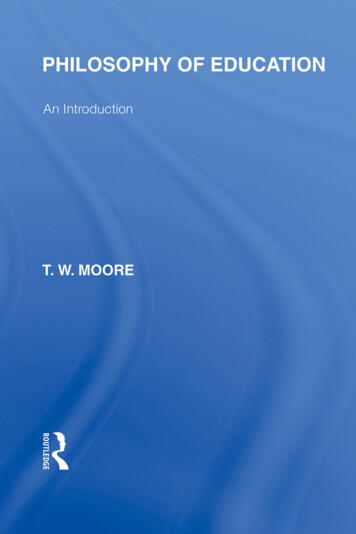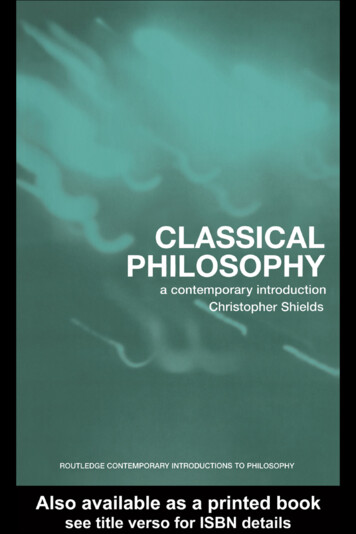
Transcription
Classical Philosophy“This is a fine introduction to ancient philosophy, consistentlyclear and carefully argued; interesting and generally attractive toread. I also enjoyed how the various views of the philosophers weresuccessfully tied to overarching themes, such as the contrastbetween the manifest and the scientific image of the world.”Vasilis Politis, Trinity College, Dublin“I found the volume well organized and philosophically engaging.It doesn’t talk down to the reader, nor attempt to blind him/herwith science (or philosophy), so it should be well suited for theintelligent non-expert.”Raphael Woolf, Harvard UniversityThe origins of Western philosophy can be found in sixth-century BC Greece. There itwas that philosophy developed into a discipline that considered such fundamentalquestions as the nature of human existence, our place in the universe, and our attitudestowards an interactive politicized society. Every development in philosophy indeed stemsfrom the thinkers of this enlightened time.Classical Philosophy is a comprehensive examination of early philosophy, from thePresocratics through to Aristotle. The aim of the book is to provide an explanation andanalysis of the ideas that flourished at this time, and to consider their relevance, both tothe historical development of philosophy and to contemporary philosophy today. Fromthese ideas we can see the roots of arguments in metaphysics, epistemology, ethics, andpolitical philosophy.The book is arranged in four parts by thinker and covers the Presocratics Socrates Plato AristotleChristopher Shields’ style is inviting, refreshing, and ideal for anyone coming to thesubject for the first time. He provides a balanced account of the central topics and ideasthat emerged from the period and includes helpful ideas for further reading.
Christopher Shields is Professor of Philosophy and Classics at the University ofColorado at Boulder. He is the author of Order in Multiplicity: Homonymy in thePhilosophy of Aristotle (1999), and editor of the Blackwell Guide to Ancient Philosophy(2002)
Routledge Contemporary Introductions toPhilosophySeries editor:Paul K.MoserLoyola University of ChicagoThis innovative, well-structured series is for students who have already done anintroductory course in philosophy. Each book introduces a core general subject incontemporary philosophy and offers students an accessible but substantial transition fromintroductory to higher-level college work in that subject. The series is accessible to nonspecialists and each book clearly motivates and expounds the problems and positionsintroduced. An orientating chapter briefly introduces its topic and reminds readers of anycrucial material they need to have retained from a typical introductory course.Considerable attention is given to explaining the central philosophical problems of asubject and the main competing solutions and arguments for those solutions.The primaryaim is to educate students in the main problems, positions and arguments ofcontemporary philosophy rather than to convince students of a single position.Classical PhilosophyChristopher ShieldsEpistemologySecond EditionRobert AudiEthicsHarry GenslerMetaphysicsSecond EditionMichael J.LouxPhilosophy of ArtNoël Carroll
Philosophy of LanguageWilliam G.LycanPhilosophy of MindJohn HeilPhilosophy of ReligionKeith E.YandellPhilosophy of ScienceAlex RosenbergSocial and Political PhilosophyJohn Christman
Classical PhilosophyA contemporary introductionChristopher ShieldsLONDON AND NEW YORK
First published 2003by Routledge11 New Fetter Lane, London EC4P 4EESimultaneously published in the USA and Canadaby Routledge29 West 35th Street, New York, NY 10001Routledge is an imprint of the Toylor & Francis GroupThis edition published in the Taylor & Francis e-Library, 2005.“To purchase your own copy of this or any Taylor & Francis orRoutledge's collection of thousands of e-Books please go towww.eBookstore.tandf.co.uk.” 2003 Christopher ShieldsAll rights reserved. No part of this book may be reprinted orreproduced or utilised in any form or by any electronic,mechanical, or other means, now known or hereafter invented,including photocopying and recording, or in any informationstorage or retrieval system, without permission in writing fromthe publishers.British Library Cataloguing in Publication DataA catalogue record for this book is available from the BritishLibraryLibrary of Congress Cataloging in Publication DataShields, Christopher John.Classical Philosophy: a contemporary introduction/Christopher Shields.p. cm.Includes bibliographical references and index.I. Philosophy, Ancient. I.Title.B171.S52 2003180–dc2l2002037170ISBN 0-203-46814-7 Master e-book ISBNISBN 0-203-77638-0 Adobe e-Reader FormatISBN 0-415-23397-6 (hbk)ISBN 0-415-23398-4 (pbk)
Dedicated with gratitude to Fred D.Miller, Jr
ContentsPrefaceAcknowledgements1234Philosophy before SocratesSocratesPlatoAristotleSuggestions for further readingIndexxxiii1295398136143
PrefacePhilosophy began in the West in a specific time and place: in Greece, along the coast ofAsia Minor, during the late sixth century BC. Though advancing with only small stepsforward at first, philosophy flowered quickly, in some ways astonishingly quickly, duringand after the life of Socrates (469–399 BC). Somehow this one man seems almost singlehandedly to have transformed a loosely knit set of far-reaching questions about thecharacter and direction of human existence into a discipline with its own distinctive aimsand methods.Now, philosophy does not own the questions it pursues; it is, on the contrary, easy tofind the great tragedians and epoch poets of Greece assaying many of the subjectspursued by philosophers. Still, it seems that Socrates in a single-minded and determinedsort of way introduced a distinctively philosophical approach, an analytical approach, toquestions of concern to every reflective person—questions about the nature of humanhappiness, about the best form of life attainable by human beings, about the relationshipbetween virtue and self-interest, and about the ultimate value of human life. In adoptingan analytical approach to these matters, Socrates almost invariably approached them byposing disarmingly simple questions about the natures of virtue or of happiness, of selfinterest, or of the human good. We all, we think, know what happiness is; it is, after all,what we all seek. Then someone like Socrates asks: What is happiness? Unwilling toaccept facile responses, Socrates then demands unassailable answers, a sort whoseproduction requires both searing self-reflection and careful critical acumen. As anystudent of Socrates quickly learns, it turns out that those who regard the answer to thissort of question as simple or straightforward will have trouble defending themselveswhen subjected to sustained scrutiny. To this extent, anyone wishing to reflect upon thebest sort of life available to human beings will benefit from an encounter with Socrates orsomeone schooled by him.Scope and aimsThis book aims to provide an encounter of this sort. It is not intended as a substitute forreading the works of the philosophers it discusses. To be sure, there is no substitute forreading the writings of the classical philosophers; so, it is hoped only that this work willhelp illuminate some of their enduring contributions by bringing them into clear focus fora contemporary audience. It nowhere assumes that the philosophical contributions madeby thinkers of this period have been superannuated or discredited by developments in thediscipline’s subsequent history. Nor does it strive to repackage the philosophicalpositions of its authors in modern garb so as to make them palatable to a contemporarysentiment. Instead, it tries to present seminal developments in the thought of the period ina sympathetic though non-slavish way, in terms accessible to someone with little or no
formal training in philosophy. Moreover, it proceeds upon the conviction that what isphilosophically defensible in the views of the authors it treats should be stated anddefended as such; by the same token, it does its subjects the service of criticizing theirtheories where they have been shown false or have been inadequately defended.Throughout, the goal is, simply, to understand and assess their views as live philosophicalpoints of view, rather than as exhibits in a museum of intellectual history.This book’s subjects include not only Socrates, though he is certainly a pivotal figurein the story it tells: it begins before Socrates with the earliest philosophers, the naturalphilosophers, called the Presocratics by scholars, a term which itself already reflects ajudgment about the towering importance of Socrates in the development of classicalphilosophy. It also considers the contributions and challenges set by a loose collection ofintellectuals and teachers, the Sophists, whose views were of great concern to Socrates,and especially to his immediate successor, Plato (429–347 BC). Plato receives extendedtreatment, because he is the first philosopher in the West to develop systematic positivetheses regarding some central topics in the sub-disciplines of philosophy which came tobe known as metaphysics and epistemology. His student and fellow researcher, Aristotle(384–322 BC), receives similar treatment. After studying some twenty years with Plato,Aristotle emerged, like Plato, as a towering figure in the entire history of philosophy.Where their views diverged, Plato and Aristotle have lent their names to orientationswhich endure today. Thus, for example, we call ante rem realists about universals—thosewho believe that there are necessarily existing abstract mind- and language-independentproperties—Platonists. Other sorts of realists, in rebus realists—who maintain thatproperties exist only when instantiated—we call Aristotelians. To some extent, theselabels may be at best only partly accurate, viewed, that is, from the standpoint of theactual views promulgated by Plato and Aristotle. One purpose of this book is precisely touncover and evaluate the actual views held by the authors who have lent their names tothese intellectual factions.In any case, this book extends only so far as Aristotle. It does not, then, pursue theimportant Hellenistic Schools which flourished after his death: the Academics, the Stoics,the Epicureans. Nor does it consider the late antique philosophy of Neoplatonism. Thisselection does not reflect any commitment to the pernicious view that one sometimeshears about ancient philosophy, to the effect that it came to a screeching halt with thedeath of Aristotle, which coincides with what is customarily regarded as the end of theclassical period. On the contrary, the importance and the technical achievement of theHellenistic Schools render their being treated in a single volume of this sortimpracticable.Already the treatment of classical philosophy offered here has, of necessity, beenhighly selective. It sets aside many issues of critical importance, a lack, it is hoped, whichwill be remedied by students who upon reading this book will begin to read more widelyin the relevant primary and secondary literatures. To this end, an annotated bibliographyof recommended readings follows the text. At the end of each chapter there follows anabbreviated list to which students might wish to turn first. At the end of the volume, amore comprehensive bibliography is assembled. Some of these readings are alsoavailable in a companion anthology designed to complement this introduction, eventhough each volume can be used independently of the other. So, students wishing further
study will do well to consult that volume along with this one. In that way, they will cometo appreciate and—it is hoped—to enter into the lively scholarly controversies whichsurround the interpretation and evaluation of the classical philosophers.Intended audience and methodsThroughout, the text focuses on the arguments of the philosophers, while neglectingmuch else of value in their writing. Thus, for example, little is said of the literary ordramatic dimensions of Plato’s prose. The approach adopted does not reflect thejudgment that these features of his writings can be safely ignored while mining his worksfor their philosophical pay-dirt. On the contrary, in order to understand Plato’s views, orthe views of the other philosophers discussed here, it is imperative to attend to their ownmanners of presentation. Still, the discussion in the text for the most part presupposesresolutions to exegetical issues which it leaves unreproduced. In some cases, this isbecause there is wide scholarly consensus on points of interpretation; in other cases, theinterpretations advanced are more controversial. In either case, though, this book willhave done its job if it has helped students to enter into the writings of the classicalphilosophers in order to understand and assess for themselves the central philosophicalpositions they advance.In keeping with other volumes in the series in which it appears, this introductionpresupposes only a little familiarity with philosophy, and also undertakes to definetechnical terms as they are introduced. It considers issues of central importance to thephilosophers it investigates, in the hope that a mastery of the issues discussed will equipstudents to range further first, and most importantly, into the principal writings of theclassical philosophers, and, second, to begin working through the professional secondaryliterature which investigates and assesses their lasting philosophical contributions. To thisextent, the work takes seriously the charge of presenting the philosophy of the classicalphilosophers to a contemporary audience—an audience which in all likelihood will findreading Plato or Aristotle for the first time somewhat alien, if also in other ways engagingand challenging. In the end, this work accepts as something more than platitudinous thecontention that the classical philosophers have a fair bit to teach a contemporaryaudience: they present views, and arguments for those views, which demand carefulconsideration not because they are the views of great philosophers now dead, but becausethey are views which, if false, are nonetheless instructive, or views which, often enough,are plausibly regarded as true and so as worthy of adoption even today. At any rate, suchis the challenge this book seeks to lay before its contemporary audience.
AcknowledgementsI thank the many students who through the years have investigated with me thephilosophy of the classical period. Material in this book has been presented in variousforums at the University of Colorado at Boulder, at Stanford University, and at YaleUniversity. Students at all these institutions provided me valuable feedback andassistance, often simply by demanding clarity and forthrightness in our discussions of thetexts here investigated. Among these students, I thank especially those at the Universityof Colorado at Boulder who read working drafts of various chapters of this work andkindly offered constructive criticisms aimed at their improvement.I also thank especially Brian Noone, who when asked to read the first versions ofsections of this work responded with copious notes and helpful suggestions and DannyKorman, for help with the proofreading. Thanks are also due to two expert anonymousreferees who read the typescript for Routledge. Their observations have improved thefinal version appreciably. Not only have they saved me from more substantive gaffes thanI care to contemplate, but they have provided judicious pedagogical advice as well.Various other colleagues, friends, teachers, and students have also influenced mythinking about the topics discussed in this work. Doubtless there are many more, but Ican detect discernible effects left by encounters with: Richard Cameron, Gail Fine, JohnFisher, Richard Geenen, John Gibert, Terence Irwin, Gareth Matthews, Phillip Mitsis,Graham Oddie, Nicholas Smith, Paul Studtmann, and Ellen Wagner. Most especially,though, I thank Rachel Singpurwalla, whose keen and alert reading of the entiremanuscript has improved nearly every page of this work.As I reflect on the process which led to the production of this book, I am also aware ofa longer-term debt, to one with the status of a sine qua non, my first teacher of Greekphilosophy, who is also indeed my first teacher of philosophy, Fred. D.Miller, Jr. Idedicate this book to him with an enduring and affectionate gratitude for the gift in life hehas given me.
1Philosophy before Socrates1.1 Thales and the earliest natural philosophersEarly in the sixth century BC,1 a man named Thales looked around at the world in whichwe live and decided that everything is water.2 This man had eyes and all of the othersenses belonging to a normal human being; there is no record of his having beenderanged, diseased, or insane. Instead, he is regarded by an ancient tradition, oneextending down to the current day, as the first philosopher.What makes him the first philosopher is not his having a perverse predilection forsaying things which are obviously false—though we are bound to regard his most famousdictum as just that. Rather, Thales stands at the head of a long tradition of investigatorsand speculators willing to make bold pronouncements about fundamental features of theuniverse which are not, and could not be, immediately accessible to sense experience orcommon sense. In some ways, then, he has a fair bit in common with scientists who tellus that if we were to move very quickly in a straight line, we would, in due course, endup back where we began, only a bit younger than we would have been had we nevermade the journey. That is not only non-commonsensical: it is an assault upon commonsense, something which seems at first blush, and in a strict sense of the term, incredible.We will come to believe it, if at all, only by being given compelling reasons whichoverride our initial impulses to the contrary.Any such reasons would take us beyond the immediate deliverances of the senses,would take us beyond the realm of common conception, would force us to conclude thatthe world is not as it initially seems. Such reasons would in general induce us to believethat the world has inner workings uncovered only by research and reflection, and thatconsequently the manifest image of the world needs to give way to a scientific imagewhich corrects and overcomes our first, naïve conception of it. These are the sorts ofreasons to which Thales must appeal if he wants to convince us that everything is water.It certainly does not seem to be the case that this is so. Why should we think otherwise?Based upon some ancient testimony, it is plausible to assume that Thales’ remarkableconjecture derives from two distinct sources, one broadly methodological and anothermore empirical in character. In the first instance, Thales evidently presumes a form ofmaterial monism: he thinks that the universe consists ultimately of some one stuff, thatthere is some one underlying material from which everything derives and into whicheverything resolves. The two parts of this commitment, its materialism and its monism,are fully distinct, but complementary.In committing himself to a form of materialism, Thales rejects a picture of the universefound in the Homeric poems, one which posits, in addition to the natural world, asupernatural quadrant populated by beings which are not subject to such laws as maygovern the interactions of all natural bodies. If all things are composed of matter, then it
Classical philosophy2ought to be possible to explain all there is to explain about the universe in terms ofmaterial bodies and their law-governed interactions. This simple thought already standsin sharp contrast to a world supposed to be populated by supernatural immaterial beingswhose actions may be capricious or deliberate, rational or irrational, welcome orunwelcome, but which as a matter of basic principle cannot be explicated in terms of theforms of regularity found in the natural world. In Thales’ naturalistic universe, it ought tobe possible to uncover patterns and laws and to use such laws as the basis for stablepredictions about the direction the universe is to take; to uncover causes and to use thatknowledge to find cures for illnesses or to develop strategies for optimizing our wellbeing; and, less practically, to find broad-based explanations to fundamental questionswhich crop up in every organized society. Such questions persist: Where did the universecome from? What, ultimately, is its basic stuff?It is perhaps these explanatory features of Thales’ materialism which gave rise to someanecdotes about him told and repeated in antiquity. Because he understood a fair bitabout cosmology, it was said, he was able to predict an eclipse of the sun which occurredon 28 March 585, a power which would have distinguished him from just about all of hisfellow citizens. For the same reason, he was able to predict long-term weather patterns,knowledge which he turned to profit by renting all of the olive presses early one yearwhen he realized, on the basis of his meteorological predictions, that a bumper crop wasto be expected. Aristotle later observed that this maneuver demonstrated thatphilosophers were capable of making money, even though they were disinclined to spendtheir time on such pedestrian pursuits (Politics 1259a9–18).3 However that may be, theanecdote also has a methodological moral not lost on Thales’ successors: naturalisticexplanations given in terms of the lawful regularities among material bodies can beexplanatorily potent by delivering predictive powers unavailable to supernaturalisticexplanations given in terms of the whims of the gods and their occasional predilectionsand fickle caprices.If a materialist explanation carries predictive power in its wake, this must be due to itshaving uncovered some regularity in nature which obtains between the features ofmaterial systems. If so, it is easy to infer that predictive power results from ourdiscovering laws of nature, that rational and empirical inquiry leads to the detection oflaws which capture basic causal and explanatory features of the universe not writtendirectly upon its surface for all to read. If we learn that the presence of streptococcuscauses infection, and that antibacterial agents neutralize streptococcus, then we can alsopredict that infections can be cured by administering appropriate antibiotics, because wehave isolated a law which was earlier obscure to us. The mere presumption of Thales thatsuch regularities or laws could be uncovered and enshrined in material explanationsalready puts him in the methodological camp of natural scientists and distances him fromthose who would explain strep throat and its attendant pain as something visited uponunworthy mortals by vindictive gods bent upon punishing them for their misdeeds.In a second way, too, Thales’ materialism should strike a methodological chord in thescientifically inclined: he is a monist, someone who supposes that, ultimately, theuniverse is composed of some one stuff. This idea does not seem itself to be immediatelyor obviously empirical in character. Still, it is a deep impulse driving a fair amount ofempirical inquiry: physical scientists have often assumed that there is some one ultimate
Philosophy before Socrates3building block, some basic and irreducible stuff, atoms or molecules or strings or superstrings, in terms of which everything is ultimately to be explained. What is the basis forsuch an assumption?Although their motivations have been varied, many scientists hold in common acommitment to parsimony in scientific explanation. They seek to reduce the broadest andmost diverse range of cases to the smallest number of explanatory laws and postulates. Itis a fact that men and women of a variety of ages, races, nationalities, politicalaffiliations, and social proclivities contract lung cancer. Scientists try to look beyond thesuperficial to determine what range of carcinogenic agents are at play in an effort toisolate the causes and explanations of their common condition. As a methodologicalprecept, parsimony in fact serves us well in such cases. If we then extrapolate upon oursuccesses, we can come to expect naturalistic explanation as such to be parsimonious,and even to use parsimony as a criterion for choosing between competing theories whichare otherwise explanatorily equivalent. Extrapolating still further and more precariously,we may also come to hope or expect that the final and complete account of the naturaluniverse will be parsimonious in the extreme, postulating ultimately some one basic stuffin terms of which all else is to be explained.Thales thought this stuff was water. He holds in common, then, with a great manymaterialist researchers a commitment to there being a single ultimate explanatory factor,one whose discovery could unify all explanations given at higher levels. But why water?We do not know, though it is clear enough that water has at least some of the features weexpect the basic stuff to have—that is, if there is a basic stuff. After all, water is plastic,in the sense that it can move rapidly between various states (liquid, solid, gas). Moreover,in its various states, it is hardly clear on the basis of gross sense perception that we evenhave a single stuff: water vapor or steam hardly appears to be the same stuff as ice. So,water at least has the ability to take on different forms, an ability necessary to the basicstuff, whatever it might be. Further, water is implicated in all living systems in one wayor another. Virtually all living things require water for life. Moreover, it turns out thatmany human systems, including human beings, are in fact composed largely of water.While this discovery does not exactly vindicate Thales’ material monism, it does tend tovalidate his instincts with respect to water. Given that we need to explain the existenceand activities of living systems in explaining the natural world, we ought to look forsomething common to them all. Here too water seems at least a reasonable first guess.Now, we do not think that water is the basic stuff; nor do we suppose Thales ultimatelyjustified his commitment to material monism. We do, however, find ourselves in variousways like him in our own methods of explanation and prediction. We are, as he is,prepared to tolerate a rejection of sense perception and common sense where scientificsystematicity requires us to do so; we are, again like him, disposed to seek out projectibleexplanations given in terms of lawlike correlations between otherwise disparate materialphenomena; and we are, finally, inclined toward parsimony in both local and globaltheorizing, just as he is. Although we do not think the basic stuff is water, at least a fairnumber of us hold out hope that Thales was after all right in form if not in content. Wehope that his commitment to materialist monism will after all be shown to be justified, ifnot by water, then by some other stuff whose exact nature continues to elude us. Andeven if we are skeptical that there will come a time when we identify the basic building
Classical philosophy4block of the universe, we will nevertheless continue to join with Thales, without apology,in seeking parsimonious and law-governed explanations on a more local scale. As thefirst philosopher, a natural philosopher, Thales set us on a course from whose essentialtrajectory we have not really deviated.Thales was joined in his earliest investigations by other natural philosophers, some ofwhom were also materialist monists. One of the most striking of these was Anaximander,who was regarded in antiquity as Thales’ principal successor in naturalistic investigation.Like Thales, he was credited with investigating a range of natural phenomena, includingeclipses and meteorological events, but was understood to have taken his inquiriesfurther, into such questions as the origin of life. His form of monism is noteworthy for itswillingness to identify as the basic stuff not one of the familiar elements, like water or air,but a postulated stuff altogether lacking in essential intrinsic features, called the apeiron:equally, the boundless, the indefinite, and the eternal. This stuff was, he thought, neitherwet nor dry, nor any color in itself at all. Anaximander’s basic stuff is so utterly lackingin intrinsic characteristics that it at least initially defies comprehension.Anaximander’s reasons for positing such a primordial stuff may have been in someways akin to Thales’ motivations for promoting water but in some other ways a bit moresubtle. In fact, it is reasonably easy to see different sorts of reasons why Anaximandermay have postulated a stuff more basic than any of the traditional four elements (earth,air, and fire, in addition to water), reasons which correspond directly to the threemeanings of apeiron already identified. In the first instance, however malleable watermay be, it has some readily identifiable intrinsic characteristics which seem to make itunsuited as a basic stuff for some of the things we observe. It is difficult, for example, tothink of water as the basic stuff of fire. By contrast, nothing prevents somethingboundless and indefinite from playing such a role. Indeed, whatever the basic stuff maybe, if there is a basic stuff, it had better be able to underlie the contrasting features soeasily observable at the macroscopic level: things are wet and dry, hard and soft, blackand white, hot and cold, liquid and solid and gaseous. Something which could constituteall such things is unlikely to be positively characterized in any such terms itself.In another way, Anaximander might well have assumed that any basic stuff wouldneed to be infinite in two distinct dimensions: in space and in time. First is the obviousthought
Classical Philosophy “This is a fine introduction to ancient philosophy, consistently clear and carefully argued; interesting and generally attractive to read. I also enjoyed how the various views of the philosophers were successfully tied to overarching themes, such as the contrast bet

